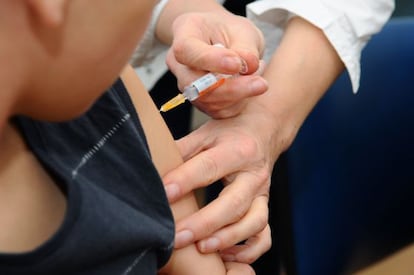Six-year-old diagnosed with first case of diphtheria in Spain since 1987
Young boy from Olot had not been vaccinated despite free service from health authorities


A six-year-old child who lives in the Catalan city of Olot (Girona) has been admitted to hospital with the first recorded case of diphtheria in Spain since 1987.
Catalan health authorities have confirmed that the little boy had not been immunized against the infectious disease, despite the free vaccination programs offered by Spanish public health services.
The Russian ambassador to Spain managed to bring the drug via plane from Moscow to Barcelona in the early hours of Monday morning”
According to information obtained by EL PAÍS, he had not been vaccinated given that his parents are against the practice.
The child, who was initially taken into his local hospital and quickly transferred to Barcelona’s Vall d’Hebron center, is currently in the intensive care unit.
There he is being treated with an anti-toxin, a drug that the Health Ministry had to search for worldwide. The World Health Organization and the health authorities in the United States were among those to whom the ministry went for help. “The problem is that these days, no one has this illness. Everyone is vaccinated,” the general secretary for the health service, Rubén Moreno, told EL PAÍS.
Eventually, the Russian ambassador to Spain managed to bring the drug via plane from Moscow to Barcelona in the early hours of Monday morning. Further doses were due to arrive on Tuesday night.
Diphtheria is an infectious disease caused by the bacterium Corynebacterium diphtheriae, which is most often likely to affect children under five and adults over 60. It is spread through direct contact or through the air, and can cause severe respiratory problems.
One out of every 10 patients dies from complications derived from the early symptoms
The last two known patients with diphtheria in Spain were treated in 1987, according to the Health Ministry.
One out of every 10 patients dies from complications derived from the early symptoms.
The existing vaccine does not protect against infection, but against the effects of the toxin that the bacterium produces. According to the Spanish Vaccine Society, systematic vaccination programs in Spain have covered more than 90 percent of the population.
In recent years, campaigns against vaccinations – due to their perceived health risk – have gained ground among parents, particularly in the United States. General secretary for the health service, Rubén Moreno, called these campaigns “irresponsible.” He continued: “The consequences of not vaccinating a child can be dramatic. The right to vaccination is for children, not for the parents to decide.”
Tu suscripción se está usando en otro dispositivo
¿Quieres añadir otro usuario a tu suscripción?
Si continúas leyendo en este dispositivo, no se podrá leer en el otro.
FlechaTu suscripción se está usando en otro dispositivo y solo puedes acceder a EL PAÍS desde un dispositivo a la vez.
Si quieres compartir tu cuenta, cambia tu suscripción a la modalidad Premium, así podrás añadir otro usuario. Cada uno accederá con su propia cuenta de email, lo que os permitirá personalizar vuestra experiencia en EL PAÍS.
¿Tienes una suscripción de empresa? Accede aquí para contratar más cuentas.
En el caso de no saber quién está usando tu cuenta, te recomendamos cambiar tu contraseña aquí.
Si decides continuar compartiendo tu cuenta, este mensaje se mostrará en tu dispositivo y en el de la otra persona que está usando tu cuenta de forma indefinida, afectando a tu experiencia de lectura. Puedes consultar aquí los términos y condiciones de la suscripción digital.








































